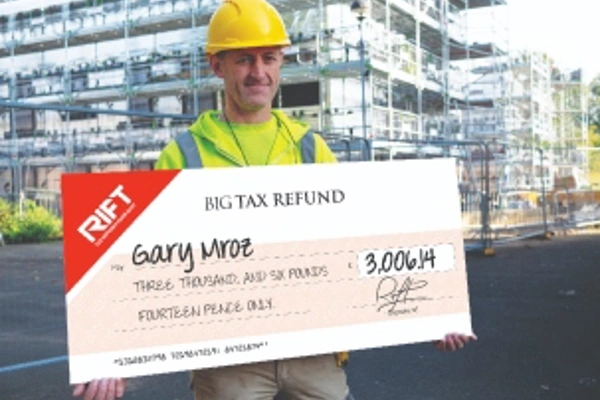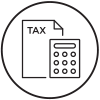
If you're in the building trade, you've got a whole vanload of out-of-pocket expenses just to do your job. HMRC's rules say that you can claim back cash for some of those expenses in the form of a tax rebate. RIFT is the UK's leading expert in builders' expenses and putting cash back into construction workers' pockets.

I was a bit wary of doing these things, but now that I've done it once with RIFT I'd be happy to come back and pass them on to anyone who's been thinking about it. Gary Mroz, plumbing foreman.

Do you qualify?
Answer our quick online questions to find out

We'll give you a call
Tell us about your work and expenses

We crunch the numbers
And handle all your HMRC paperwork

You get your money
Your rebate is protected by our guarantee
We do the work, you enjoy the rewards!
RIFT Tax Refunds is the UK's leading expert in builders' expenses - so if you've got a whole vanload of out-of-pocket expenses just to do your job, let us put that cash back in your hands where it belongs.
It takes seconds to find out if you're due a tax rebate! On the books or self-employed, we'll handle everything for you.

When you're on the books you can claim for a range of things including:
1 in 3 construction workers are paying too much tax so make sure you don't miss out!
When you make a tax refund claim, you’re going to need to prove to HMRC that you’re owed money. That means:
You may already have a Personal Tax Account (PTA) set up at HMRC. If not, we’ll help you get one sorted out. Your PTA keeps all your key information together in one place. It’s a useful thing to have when you’re claiming a tax rebate.
HMRC likes to take its time over things, so you’re probably looking at 8-10 weeks for them to pay out your refund. Of course, the sooner RIFT gets to work, the sooner you’ll have your money. Remember, you can claim your overpaid tax back for up to 4-years, so there’s no reason to miss out on what you’re owed.
RIFT was built to help the UK’s tradesman community tackle the taxman. With our specialist construction teams, we’ve got the experience and expertise to get the best out of your yearly tax refund claims. We keep everything smooth, simple and painless, with a specialised route calculation system to track your mileage and a free MyRIFT account to check details, upload receipts and track progress.
It takes some legwork to put together all the information needed for a tax rebate claim. RIFT will chase up all those essential details and documents for you and go toe-to-toe with the taxman until your claim’s paid out. We can even track down tricky information if your old worksites or employers no longer even exist!
RIFT is on excellent terms with HMRC, construction bodies and unions, so we’ve got all the tools to get your refund done right. Crucially, we take all the “grunt and grind” out of tradesman tax deductions for you. With a free MyRIFT account at your fingertips, your days of ploughing through mountains of paperwork are over forever.
With RIFT's unique guarantee, you've got no worries about the taxman demanding any of your tax rebate back. Just give us the complete and accurate information we need and we’ll protect you and your cash from HMRC enquiries. If they disagree with the amount we’ve claimed for your expenses, we’ll pay them back out of our own pockets, not yours!

RIFT guarantee
If HMRC wants your refund back, we cover it.

No hidden costs
It costs nothing to find out if you have a claim.

Outstanding service
Rated by Institute of Customer Service.

All aftercare included
Free tax advice throughout the year.
When you’re working a Pay As You Earn (PAYE) job and travel to temporary worksites, you’re probably owed some money back from HMRC. In the building trade, you’re likely to spend a lot of your time clocking up mileage that counts toward your yearly refund. Not only that, but a lot of the other day-to-day costs you’re shelling out for could qualify for tradesman tax deductions. Meals, accommodation on the road and upkeep of your equipment and uniform can all contribute to your refund claim. Even fees and subscriptions to unions and other professional bodies can count as builders’ expenses if they’re necessary for the work you do.
We know it sounds like a nightmare keeping track of all the information needed for your claim, but MyRIFT keeps everything quick and hassle-free. Everything can be uploaded straight from your phone. You can even instantly upload photos of receipts on the go!
Even if you’re self-employed on CIS, RIFT can still help. We’ve got expert teams of Construction Industry Scheme specialists to explain exactly what you’re owed - and get it back in your pocket fast. We've even got a CIS tax rebate calculator to give you an estimate of how much you could be owed back from HMRC.
It takes under a minute to discover what you could claim with our free tax refund calculator. Once you’ve got your estimate, we’ll get to work on claiming it back for you. RIFT will prepare and file your claim, then chase the taxman until it’s paid out. We’ll keep you updated throughout the process. All you’ll need to do is plan how to spend your refund.
Working under the construction industry scheme (CIS)? You'll be entitled to claim a tax rebate. Check out our CIS tax rebate calculator for estimate of how much you could get back from HMRC.
HMRC’s been cracking down on “cash in hand” arrangements in construction for a while. That’s really what the Construction Industry Scheme’s all about. Under CIS rules, you’re basically paying a chunk of your Self Assessment tax in advance. It’s a slightly clunky system, and it leaves a lot of self-employed construction workers out of pocket.
If you’re shifting out of PAYE construction work and into self-employment, RIFT can help. We’ll get you set up for CIS, handle your Self Assessment paperwork and make sure you never end up overfeeding the taxman.
Our reps travel around the UK, clocking up thousand of miles each month to put cash back in the pockets of UK construction workers. You can meet them wherever suits you: on-site in the canteen, at your own home or even down the local pub!
The tax refund system is for anyone paying their own way to temporary worksites or reaching into their own pockets for the necessities of their job. It costs nothing to get an estimate of what you could be owed. In fact, RIFT won't charge you a penny until your refund is paid out.
Here are the best ways to get your refund rolling:
Claiming a tax rebate means you’re letting HMRC know that you’ve paid too much tax over the year (or in previous years). Of course, the taxman isn’t simply going to believe you and pay out automatically. He’s going to need to see some paperwork before he coughs up any refund cash. That’s a big part of what puts off so many people from getting back what they’re owed – assuming they even realise they’ve overpaid in the first place.
Tax refund claims need to stick to some very strict rules and deadlines. Not understanding these leaves a lot of people never coming close to getting back everything they’re due. Worse still, some of them end up in serious trouble with HMRC.
With RIFT on your side, though, you’ll never have to worry about missing out or getting in hot water with the taxman. We’ll guide you through the whole process, get your full refund back for you and keep you in HMRC’s good books every step of the way.
To get back everything HMRC owes you, you’ll need to back up your claim with evidence. Generally, that means details of where you’ve worked and what you’ve spent just to do your job. P45s, MOT certificates and wage slips are the basic tools of the trade here – and the more of them you have, the smoother the ride will be.
That said, you don’t need every single scrap of paperwork at your fingertips to start your claim. In fact, RIFT can help you track down a lot of what you’ll need, even contacting old employers or calculating mileage to worksites that no longer exist!
With your MyRIFT account all set up, things get even easier. Instead of hoarding receipts all year, you can simply upload the details of your expenses as you go. You can check and update your information at any time, from anywhere in the world. When you come to claim again the following year, you’ll find most of the work’s already done. All you’ll need to do is update the information that’s already in your account.
When you’ve got a second job or other income, it can make a big difference to your tax situation. For PAYE jobs, you’ll have a separate tax code for each. However, only one of them will have your tax-free Personal Allowance attached to it. That means your other job will be taxed from the very first penny you earn.
Things can get a little tricky in tax-land when you’ve got more than one source of income. Tax codes can change over time, and it’s easy to end up paying the wrong amount. RIFT will always keep your refund claim on track, and make sure you don’t end up losing out.
When you get a few “extras” on top of your wages at work, you’ll often find yourself being taxed on them. Things like free medical insurance, interest-free loans and company cars can all count as taxable “benefits in kind”. There are some exemptions, though, like your employer’s contributions toward your pension or a subsidised work canteen. Things like free medical insurance, interest-free loans and company cards can all count as taxable ''benefits in kind'' and will need to be added to your P11D form.
Let RIFT know if you’re getting any benefits in kind when you’re claiming a tax rebate. Our expert teams will steer you right.
Yes! In fact, stopping work part-way through a tax year is a pretty common reason why people end up being owed some PAYE tax back.
When you’re working through PAYE, the tax taken out of your wages is based on the assumption that you’ll be earning steadily all year. If that income gets choked off early, it can be like paying tax on money you’ll never even earn.
What you’re owed depends on your situation. If you start claiming a taxable benefit after your previous job ends, for instance, it can bring down your refund amount. There’s still never a good reason to leave your cash in the taxman’s pocket, though.
Just answer our 4 quick questions to get an idea of what you could claim. It takes under a minute to do and will set you on the path to getting your overpaid tax back where it belongs.
Don’t stress out if you get a P800 tax calculation form from HMRC. It might actually be good news! Being sent a P800 means HMRC has noticed that you’ve paid the wrong amount of tax, one way of the other. If you’ve overpaid tax, you’ll get an automatic refund. If you’ve paid too little, they’ll let you know how they’ll be clawing the rest back (probably through a change to your tax code).
Don’t ignore a P800 if you get one. If you can’t understand why you have it, talk to RIFT and we’ll sort it out. If there’s a mistake, we’ll get it fixed for you.
When HMRC talks about builders’ work clothes, they don’t just mean any old clothing you happen to wear on the job. We’re talking about work-specific stuff only here, like protective clothing or things with company logos on that your employer insists you wear. Repairing the feathers of a full-body chicken outfit might be a valid expense for a children’s entertainer, for example. If you’re a scaffolder, though, the taxman won’t be impressed if you try claiming for it.
If what you wear counts as builders’ work clothes, you can claim back some tax on the costs of repairing, cleaning or replacing it. The same goes for Personal Protective Equipment, as long as you’re meeting the costs yourself. If your employer’s paying up-front or reimbursing you later, you won’t have a claim. Similarly, if your work provides a free laundry service, don’t expect a hand-out from the taxman. Even if you decide not to use the free option, the fact that it exists means you can’t claim for your laundry costs as builders’ expenses.
If you’re self-employed, however, things change a lot. When you pay tax through the Self Assessment system, a lot of your everyday business costs bring down the amount of profit you’re being taxed on. That means, for example, that the initial cost of your work-specific clothing will generally count as an “allowable expense”, meaning less tax to pay. HMRC will still probably have questions about that chicken suit, though…
If keeping precise records of every work expense you run up during the year seems too much like maths homework, there’s an alternative. With Self Assessment, you can use “flat rate deductions” instead of precise bookkeeping to add up your expenses. For people with PAYE jobs, there’s the “simplified expenses” system. Either way, you’re basically just using HMRC’s guesswork to claim a fixed amount instead of your doing own calculations. You probably won’t get back everything you’re owed this way, but it’s less hassle overall. Contact RIFT and we’ll talk you through your best option.
We know that construction workers like you can clock up a huge amount of miles travelled during the working year so it's important you don't miss out on the tax you could be owed on it. Use our mileage tax relief calculator for an instant estimate of how much your tax rebate from HMRC could be worth. Click on the button below to get started.
Help your mates get their tax rebate and get extra cash in your own pocket!
At RIFT, we love it when happy clients tell their friends about us. We love it so much that we’re rewarding you for doing it!
We'll give you £100 reward for every friend you refer (T&Cs apply) when they make their claim with us, plus an extra £150 bonus for every 5 people you refer who end up claiming.
Use our Refer a Friend form to get started. We'll get in touch with your friend to let them know you think they might have a claim. Then just wait for the rewards to roll in!

RIFTAUTH1 - SchedulingPublisher
{ "@context": "https://schema.org", "@type": "BreadcrumbList", "itemListElement": [{ "@type": "ListItem", "position": 1, "name": "Home", "item": "https://www.riftrefunds.co.uk/" },{ "@type": "ListItem", "position": 2, "name": "Tax Rebates", "item": "https://www.riftrefunds.co.uk/tax-rebates/" },{ "@type": "ListItem", "position": 3, "name": "Construction PAYE", "item": "https://www.riftrefunds.co.uk/tax-rebates/construction-paye/" }] }